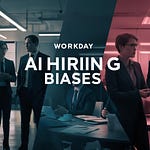Every industry has its jargon, but nowhere has the vocabulary of job cuts evolved faster than in big tech. Layoffs used to be called just that - layoffs. Now, companies frame workforce reductions under euphemisms like “RIFs,” “restructuring,” “realignment,” and “VEPs (Voluntary Exit Programs)” - all signaling a sweeping shift in corporate priorities.
At the heart of this transformation? AI.
As Google, Amazon, Microsoft, and Meta refine their AI strategies, their approach to human capital is under intense scrutiny and leaders scramble to frame workforce reductions in a positive light and less like leadership failure. Automation is accelerating, and businesses are weighing where AI can replace jobs, augment existing roles, or create entirely new functions. What remains unclear is whether companies will prioritize workforce adaptation or simply rely on strategic job eliminations.
This week’s biggest AI governance moves reflect these tensions. From Google’s VEP to NYC’s AI layoff tracker to Mattel’s AI-powered toys, the decisions made today could redefine the future of employment in ways we’re only beginning to grasp.
Each entry is scored based on the Exploitation vs. Accountability Index (0-100) (where 0-39 is categorized as Exploitation, 40-55 represents ethical ambiguity and 56-100 is categorized as Accountability)
1. Google’s Voluntary Exit Program (VEP)
Google has launched a buyout initiative for employees across divisions, including Search, Engineering, Marketing, and Research. This move is part of broader cost-cutting efforts, but critics (i.e me) have argued that reskilling initiatives should have been prioritized instead of workforce reductions.
📊 Exploitation vs. Accountability Score: 32 (Exploitation)
Google’s VEP prioritizes reducing headcount over workforce transition strategies, leaving displaced employees without AI-driven career adaptation opportunities.
2. NYC AI Layoff Tracker
New York has begun tracking AI-driven workforce reductions, aiming to improve public visibility into job losses caused by automation. While this is a proactive step, corporate transparency remains uncertain, as companies may not fully disclose AI-related layoffs or provide detailed breakdowns of job displacement.
📊 Exploitation vs. Accountability Score: 68 (Accountability)
The tracker offers public insight into AI-driven job losses, but lacks enforcement mechanisms.
3. Disney/Universal Sue Midjourney
Disney and Universal have filed a lawsuit against Midjourney, arguing that its AI-generated content violates copyright protections by replicating characters like Shrek, Iron Man, and Buzz Lightyear without licensing agreements. The lawsuit could set an important precedent for IP protection in AI-generated media.
📊 Exploitation vs. Accountability Score: 56 (Accountability)
Companies deserve the ability to defend their copyrighted material, and this lawsuit reinforces the need for stronger legal frameworks to govern AI-generated content.
4. CETU Delivers Accountability: Nate CEO Charged with Fraud
The CEO of Nate, an AI-driven e-commerce startup, has been charged with fraud, marking a major enforcement win for the SEC’s Cyber and Emerging Technologies Unit (CETU). The case underscores AI governance in financial transactions, highlighting how CETU’s oversight ensures accountability in AI-driven business models. The Cyber and Emerging Technologies Unit (CETU) was established by the SEC to combat cyber-related misconduct and protect retail investors in emerging technologies like AI, blockchain, and cybersecurity
📊 Exploitation vs. Accountability Score: 88 (Accountability) Fraud charges reinforce the need for transparency and ethical AI business practices, while CETU’s role demonstrates effective regulatory enforcement in policing AI-driven financial misconduct.
5. Mattel & OpenAI Partnership
Mattel has teamed up with OpenAI to integrate generative AI into toy-making and digital experiences, introducing AI-powered storytelling and interactive play. While the partnership promotes innovation, concerns remain about data privacy, corporate-controlled imagination, and AI’s influence on childhood development.
📊 Exploitation vs. Accountability Score: 52 (Ethical Gray Area)
The collaboration raises serious questions about consumer targeting for kids, the possibility of early tech dependency in children, and the role of AI in creativity, placing it in an ethical gray zone.
🎖 Bonus: CSA AI Trustworthy Pledge
The Cloud Security Alliance (CSA) has launched an AI governance initiative encouraging organizations worldwide to commit to ethical AI development, transparency, and privacy protection. The pledge signals industry-wide recognition of AI safety concerns, though enforcement mechanisms remain weak.
📊 Exploitation vs. Accountability Score: 73 (Accountability)
This move encourages responsible AI practices, but lacks legal binding power, making it more of a symbolic commitment than a regulatory framework.
Where AI Governance Is Headed Next: Directives for Law/Policymakers, Business Leaders
✅ Mandated Reskilling Programs for AI-Disrupted Jobs. Kudos to New York for tracking AI-driven workforce reductions. But that’s just the first step. To maintain healthy levels of employment cities must enforce corporate commitments to workforce adaptation, ensuring displaced employees receive training and support rather than being left behind.
✅ Strengthen AI Copyright Protections. Lawmakers must define and enforce regulations preventing AI models from training on copyrighted material without consent. Creators deserve clear rights and protections.
✅ Eliminate Corporate Euphemisms for Layoffs. Regulatory bodies must require transparency in workforce reductions, preventing companies from masking job cuts behind terms like VEPs, restructurings, and role eliminations that obscure real impacts to employees and position them as failures in the job market.
✅ Create AI Consumer Protection Frameworks. As AI-driven products (like Mattel’s AI-powered toys) target children and vulnerable users, regulators must introduce strict oversight on data privacy, content ethics, and responsible AI interaction.
✅ Establish Enforceable AI Ethics Standards. Industry-led pledges (such as the CSA AI Trustworthy Pledge) must transition from voluntary commitments to enforceable frameworks with real accountability measures for companies developing AI.
References
https://www.msn.com/en-in/money/news/google-layoffs-2025-another-round-of-job-cuts-voluntary-exit-program-rolled-out-across-teams/ar-AA1Gv92R
https://www.msn.com/en-us/news/technology/openai-and-barbie-maker-mattel-team-up-to-bring-generative-ai-to-toy-making-and-content-creation/ar-AA1GBcyE
https://cloudsecurityalliance.org/press-releases/2025/06/12/csa-ai-safety-initiative-named-a-2025-cso-awards-winner
https://techcrunch.com/2025/04/10/fintech-founder-charged-with-fraud-after-ai-shopping-app-found-to-be-powered-by-humans-in-the-philippines/
https://www.msn.com/en-us/news/technology/disney-universal-file-first-major-studio-lawsuit-against-ai-company-sue-midjourney-for-copyright-infringement-this-is-theft/ar-AA1GwsiR
https://www.sec.gov/newsroom/press-releases/2025-42













Share this post